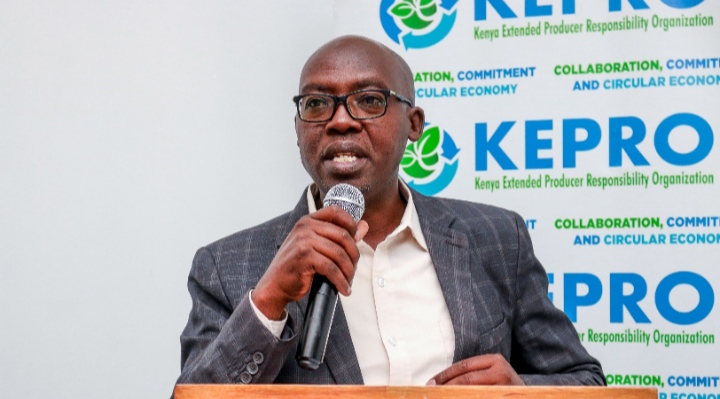Eldoret,
Friday, April 19, 2024
KNA by Judy Too
The Kenya Extended Producer Responsibility Organization (KEPRO) has entered into public-private partnership with the Uasin Gishu county government in combating improper solid waste management practices.
Speaking during the sensitization drive at Boma Inn Eldoret, the Director KEPRO Richard Kainika noted that the sustainable Waste Management Act 2022 was put in place because of the need for sustainable waste management practices.
“It is also targeted to reduce pollution because we have a serious problem with pollution in our country. The act promotes the circular economy for green growth practices,” he said.
“This event is important to waste management actors in the county and the producers of products that are coming to the market as it is the implementation of the sustainable Waste Management Act 2022,” noted Kainika.
He noted that the act stipulates that all producers must extend their responsibility of their product that they introduce in the Kenyan market at post-consumer stage.
“As a region, we need to avoid dumping waste and see whether through circular economy practices we can rethink the design of our products so that instead of dumping using the linear model economy we can begin to embrace the circular economy,” said Kainika.
“As representative of Kenya Association of Waste Recyclers, we inform the young people of the potential that is in waste. In this association, we register private sector businesses, entities that are involved in extraction of value from waste and these businesses create a lot of jobs in the country,” he added.
“We are currently recycling around 20 percent and with this act in place, we are targeting to do 85 percent whereby we are going to grow the recycling industry to more than 300 percent of what we have today,” noted the director.
“It is a significant move and this is something that we plan to do all over the country so that in years to come, we will have a robust circular economy happening in Kenya,” he said.
“We will minimize dumping and littering and in place we will grow our businesses and industries even as our design and technology advances to minimize waste that cannot be recycled and products that cannot be reused or refurbished,” he noted.
The National Council for Population and Development (NCPD) Regional Coordinator Bernard Kigen noted that from the perspective of our population, the council emphasizes the significance of partnerships and widespread dissemination of information on waste management because if waste cannot be managed, it can cause serious threats to humans.
“It is therefore important that stakeholders take up their responsibilities to ensure sustainable waste management practices in our environment,” he said.
National Coordinator Kenya Platform on Climate Governance, North Rift Economic Bloc (NOREB) region David Busienei said they deal with matters on climate change and work under four thematic areas relating to climate action, the climate adaptation, climate mitigation, climate advancement and climate technology.
“With collaboration with KEPRO as they deal with waste management, it is important when it comes to climate mitigation and adaptation,” said Busienei.
“We are giving KEPRO the platform to disseminate the information and sensitize the community around and we are calling upon the community to be part of that platform so that we can work together and move forward,” he noted.
Director National Environment Management Authority (NEMA), West Pokot County Cliff Barkach, said that the sustainable Waste Management Act is a good law because it gives responsibility to waste generators and the producers to ensure that plastics they have generated do not contaminate the environment.
He urged the producers to come up with a plan on how they are going to remove these substances from the environment so that the county government does not take up the burden to collect the waste they did not generate but instead the county government would only be dealing with mismanaged waste.
He urged all waste value actors to reach out to NEMA for licensing, ensuring compliance with minimum conditions for operations.
He further added that all Kenyans should ensure they separate their waste at source so that it is easier for that waste to be taken back to recyclers.
Courtesy; KNA


